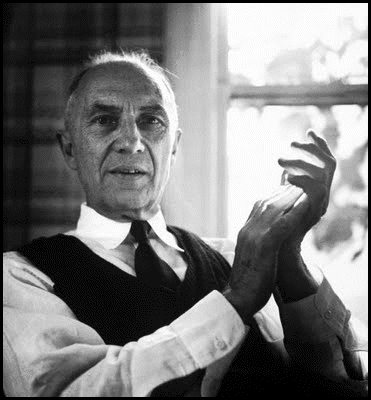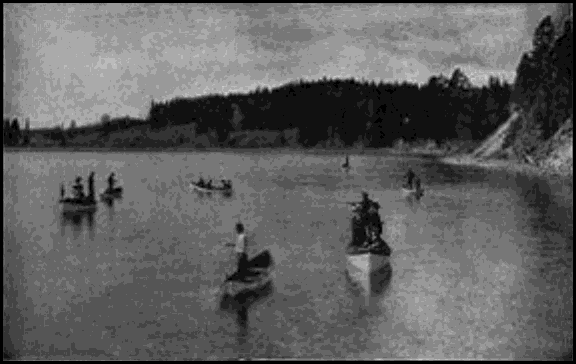William Carlos Williams
(New Directions)

- Old age is
a flight of small
cheeping birds
skimming
bare trees
above a snow glaze.
Gaining and failing
they are buffeted
by a dark wind ---
But what?
On harsh weedstalks
the flock has rested ---
the snow
is covered with broken
seed husks
and the wind tempered
with a shrill
piping of plenty.
In the American Grain could probably be considered a series of long poems, even though it is written in prose. "Abraham Lincoln," one of the best, is just one page long. Williams says that Lincoln is just like Mengelberg, "the great broad hipped one," who "conducts an orchestra in the same vein. It is a woman."
Lincoln? A what? A woman? Eh? "A great bearded face and a towering black hat above it, to give unearthly reality."
- Brancusi should make his statue --- of wood --- after the manner of his Socrates, with the big hole in the enormous mass of the head, save that this would be a woman ---
As for Ben Franklin, Williams says that "Poor Richard's Almanac was as important in founding the nation as Paine's Age of Reason --- he adaged them into a kind of pride in possession." George Washington is described as man of "dangerous rudeness" --- excellent conceit --- but Washington always coveted his "vine and figtree" (his home and his quiet). Know Washington "and you will know practically all there is to understand about the beginnings of the American Republic."
Williams is at his best with the short epics: Washington, Lincoln, Boone. Sometimes the longer ones, Franklin, Aaron Burr, Père Rasles (which is mostly about Williams' trip to Paris) go off the road and run into trees, but the briefs are sometimes too lovely for words: "Brancusi sat us by his fire, the sheep slept about us while by constant rubbing his fingers carved the neck of his staff."
reading
from this book
True Tales from Gleaners,
Scavengers and Dumpster Divers
Laura Pritchett, Editor
(Oklahoma)
Look behind the townhouses (they prefer dumpsters to cans). And bring a ski pole ... "to use as a stick to bring things up or to poke through bags." The key word, apparently, is "gleaning." The painter Jean Millet is cited in Linda Hasslestrom's "Gleaning with Mac." She roams the back alleys of Cheyenne, tells us that she has found "shovels, rakes, tomato cages ... watering cans, rolls of fence wire, cake pans, dozens of canisters with tight-fitting lids, and rugs I use for mulch around trees."
Jack Collom teaches school in Boulder, has his kids write essays on "Things to Save." This is what Juli Koski (fifth grade) wrote,
- I'd like to save the sweet chocolaty chewy candy bars that melt in your mouth, the warm cozy pillow that you can't wait to sleep on, I'd like to save green meadows that you run barefoot across running and running until you collapse on the wet soft grass, the hot days when you try to eat ice cream but it melts and plops on your foot, I'd like to save the amusement parks where you go on a twisty ride and throw up all over yourself but that's just what you thought would happen, I'd like to save the little green bug my big brother viciously killed six months ago, I'd like to save the world all green and blue and beautiful, I'd like to save the little things that everyone enjoys.
Charles R. Boning
(Pineapple Press)
Mr. Boning has collected sixty rivers here, including those that should be part of any Anacrostics puzzle, including the Loxahatchee, the Withlacoochee, the Homosassa, the Ocklawaha, the Sopchoppy, the Choctawatchee --- not to mention Fisheating Creek and the very gentle Peace River.
Each river is graded according to type, substrate, length and watershed, and is given stars for "Ecological Condition." Most get four stars, but the Econfina is awarded five, possibly because of its name. Thanks to the influx of all those nitwits from the Middle West, the Miami River gets one.
Dredging, dams and the U. S. Corps of Army Engineers have done their best to degrade the Caloosahatchee near Ft. Myers to two stars, and the great 300-mile-long St. Johns river where I grew up is down to three. When I was a tad, it was filled with beautiful hyacinth plants with purple flowers. But there were, also, streams of people poop and used, tired condoms. (We always tried to get that dummie Timmy Rodgers to fish the condoms out and blow up the floating baby-stoppers like they were mere balloons.) We also did our best to destroy the hyacinths, not knowing that they were a natural people-poop fighter.
In the summers, we spent our weekends out on the Nassau River, where the brute lessons of ecology began. The piggy paper people had put in a giant pulp mill upstream, and soon the trout, groupers, sheepshead and drum were dead gone. There were no more blue-point oysters, and even the hardy blue crab had disappeared. "You have to pay a price for progress," said our not-too-wise elders.
Inner Peace for
Everyday Living
Siroj Sorajjakool
(Templeton Foundation)
Non-being is what he advises: "to act without acting" ... " to do without doing" ... to be "good for nothing." He hones in on the "three nothings," culminating with Merton's advice, "As soon as man becomes aware of doing good and avoiding evil, he is no longer perfectly good."
- Good is good when it has become good for nothing.
There is here a touch of --- could we suggest? --- anti-Christianity (or at least anti-Fundamentalism). "A person who constantly struggles with a conflicting sense of good and evil is a person who is trapped within himself or herself."
- In seeking to rid ourselves of sin, we remain captured by sin.
It is a captivating view of what the Buddhists know of as "non-duality." It is the unwillingness to divide ourselves into what Krishnamurti called "the observer" and "the observed."
Sometimes, when the author quotes Chaung Tzu, one can find oneself quite baffled, "Being is born of non-being that differs from being, whose not-yet-beginning to not-yet, non-being is." But for The Way of Learning to Become Nothing ... this has to be one of the best guides we've found.
Floating the Past in Real Time
John Holt
(AK Press)

Holt is a country boy. He is nuts about hunting, fly fishing, chewing tobacco, and drinking bad red wine. He lives in Livingston, Montana, travels throughout the upper reaches of the Yellowstone River --- one of the last undammed big rivers in America. He always totes a gun and when he runs into a cop car by mistake instead of turning himself in like you and I would he runs away.Despite all this, his heart seems to be in the right place. He just wants to be left alone, or to be in the wilds with his ladyfriend Ginny. "She liked the same things I did, loud music, strong drinks, photography, late nights, camping, solitude, benign madness, fly fishing, driving way too fast, smoking lots of cigarettes, raising hell. So we were soon living together."
Holt is a fine instructor for the novice camper. He goes to the mountains and valleys, upstream and downstream ... out in the wild, even hears the wild song of boreal chorus frog. They "make a fearful lot of noise, screaming their little lungs out in full-tilt, mating frenzy and sounding like countless fingers running over the teeth of an infinite number of combs."
Maybe it always will be [he thinks] ... like the first time with a woman or the first hit of some psychedelic drug I did long ago.
--- Carlos Amantea